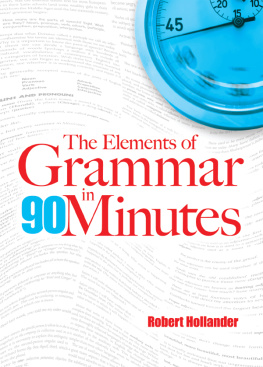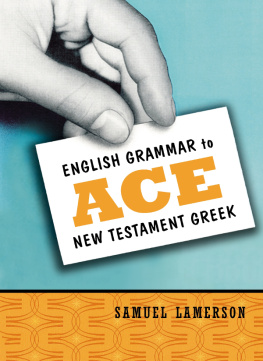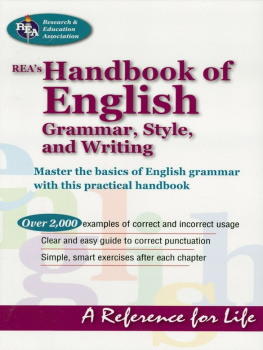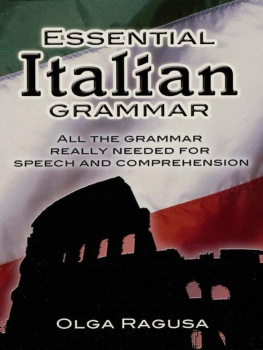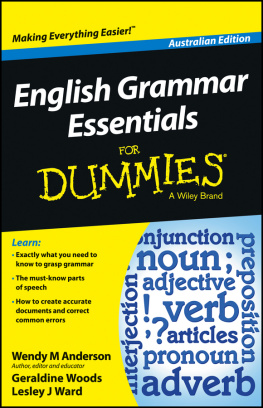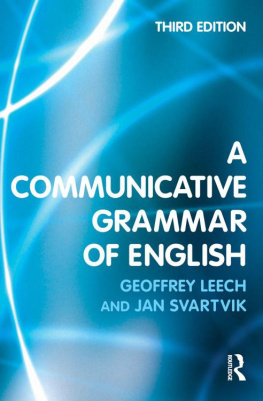The Elements of
Grammar
in
Minutes
The Elements of
Grammar
in
Minutes
Robert Hollander
Dover Publications, Inc.
Mineola, New York
For Justice Stephen Breyer, whose remarks about the parts of speech, made a few years ago, spurred me to write this little book.
Copyright
Copyright 2011 by Robert Hollander.
All rights reserved.
Bibliographical Note
The Elements of Grammar in 90 Minutes is a new work, first published by Dover
Publications, Inc., in 2011.
Library of Congress Cataloging-in-Publication Data
Hollander, Robert, 1933
The elements of grammar in 90 minutes / Robert Hollander.
p. cm.
ISBN-13: 978-0-486-48114-2
ISBN-10: 0-486-48114-X
1. English languageGrammar. 2. English languageGrammarProblems, exercises, etc. I. Title.
PE1112.H627 2011
428.0076dc22
2010052826
Manufactured in the United States by Courier Corporation
48114X01
www.doverpublications.com
ACKNOWLEDGMENTS
All parents know what a pleasure it is to acknowledge a debt to ones own children. Both Zaz and Buzz agreed to be guinea pigs, reading drafts of this book with helpful suggestions for amendment, thus revealingyet againjust how wise I was when I chose their mother.
I would like also to thank my friend Sevilla de Guzman, a Philippine-American and thus representative of one group of people whom I hope this book will serve, those who have come to this country without the benefit of a formal introduction to English grammar and who feel its lack. Sevilla was the first external reader of this book and I learned a lot from her reactions.
John Beall, head of the English Department at Collegiate School, on the Upper West Side of Manhattan (where, in addition to his more expected commitments, he regularly teaches his eighth-grade students how to read Dantes Commedia), offered a series of useful comments, some of which are reflected in this final draft.
My friend John Angus McPhee has not only furnished many examples of our language working at its best, but has helped shape the conception of this book; a pupil whom he and I shared at Princeton University, David Remnick, now known for much more than for those who taught him, has also offered helpful advice.
My largest debt is to David Phillips. I first met David when I was twenty-two and he twelve, a seventh-grader in one of the first English classes I taught after I graduated from college, at Collegiate School. I still remember with awe some of his accomplishments as a young reader and writer. We both left Collegiate for greener pastures and I lost track of him until, in the fall of 2009, the alumni news from Collegiate contained a note from him. A few e-mails later, I told him that I had been working on this book about English grammar and felt that I needed help putting it into better shape. The present form of the text is chiefly the result of his intervention. I am most grateful to him.
TABLE OF CONTENTS
Subject, Object, and Predicate
Clauses and Phrases
Kinds of Sentences
This book offers instruction in the basic rules of English grammar. It is offered to those in need of such assistance, either because they were never taught these rules or because they have forgotten what they once were taught. I am aware that the person reading this probably has many competing projects alongside a desire to know English grammar better. Thus, at the outset, let me make you this promise: If you put ninety minutes of your full attention into this short book, you will gain at least a working sense of the basics of English grammar. I hope the investment that you have made in acquiring it (and plan to make in studying it) will at least be matched by an improvement in your understanding of our common language.
My purpose is not theoretical but practical. Further, this is not a work about stylistics, like Strunk and Whites The Elements of Style. While there are many such aids and while consideration of stylistic choices is a useful adjunct to the study of grammar, my central concern is grammar itself. This is also not a reference work concerning the refinements of speaking and writing. Many of these are also already available. My aim is differentto offer a basic understanding of English grammar conceived as the logical arrangement of the parts of a sentence in other words, the building blocks of the English language.
This subject has by common consent (in America anyway) been largely banished from study and even from conversation, except for a random presence in scattered classrooms, many of them devoted to the teaching of foreign languages. Some of us only learned the grammar of our own language when we happened to study a language other than our own. Thats how I learned, quite some time ago in high school, since my grammar school, a so-called progressive school, had banned grammar from its curriculum as a matter of educational policy.
The idea for this project came out of my experience at a Renaissance Weekend in Charleston, South Carolina, in December 2005. In an exchange with another panelist, I pointed out that the word grammar was rarely or never heard in politicians frequent references to the problems of American education. Although we often hear our elected representatives speak about this crisis, I said, we never hear them mention that millions of our fellow citizens know very little about the rules that govern our use of languagethat is to say, grammar. Some years ago, I continued, I asked a class of Princeton students what St. Augustine and his fellow fourth-century students of Latin learned when they studied grammar. No one in that wood-paneled room knew; I explained that those young North African students were first taught the parts of speech.
How many of these are there, I asked? Several guessed, but no one knew. When I tried to have the members of the class identify them one at a time, they came up short again. Eventually I had to introduce these college students to the traditional eight parts of speech. And I also told them that their ignoranceshocking though it was in students at a celebrated American universitywas not their fault but ours, the adults in charge of their education.
As I began writing this book, I decided to test my sense of the political isolation of grammar by searching the Congressional Record for 2007. By July of that year its database already contained over 11,000,000 words in 10,400 documents. The word education occurred 11,199 times in 1,810 documents, but grammar only 13 times (in 11 documents). Of those 13, nine appeared in the phrase grammar school, which has come to mean a school where grammar is no longer taught. And most of those nine were not even about education, but were just the names of schools certain people happened to have attended. In all those words there was only one mention of grammar as important to educationin a speech by Senator Thad Cochran (R-Miss.) supporting reauthorization of the National Writing Project. He said:
Writing skills for employment in the 21st century require not only the grammar, construction and analytical thought of traditional writing, but the skills needed to communicate effectively using new technology.
If I was wrong back there in South Carolina, I was not wrong by very much. In all those Congressional hours of discussion, debate, gilded rhetoric, and heartfelt pleading, in all that time spent lamenting the neglected condition of American education, it was said only once that people need to know grammar in order to write effectively. Most American children are no longer learning to use this basic and important tool, and thus are deprived of what isor should betheir birthright.
It was not always so; it need not remain so. Grammar could (and should) be put back into the grade-school curriculum in a meaningful way. What used to be called English is now often referred to as Language Arts, yet these do not include a serious study of what, some sixteen centuries ago, was called the first art. Grammar helps us clarify our thoughts, control our own writing and speech, and avoid error (including the sometimes paralyzing fear of error). Knowing grammar helps enable the close study of written texts, not only literary texts but any writings (for example, contracts) that require analysis. Grammar is essential for editing ones own and others writing; further, it assists our study of other languages.
Next page
